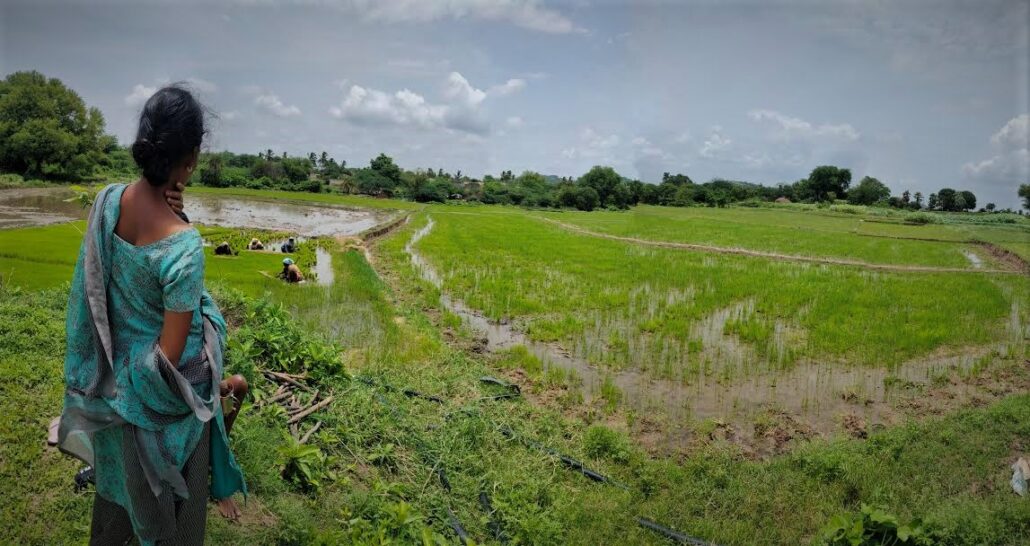
Etikala Bhavani
The Global Pandemic has brought the class disparities right on to our mobile screens. The three basic needs khana makaan aur kapde became rare resources for a huge section of the country. It overwhelmed the country. What goes unnoticed even when it is rising is gender differences. The federal system in the country should be made potential enough to address it. We say ‘Asli’ India is in villages. It is prime time to create awareness programmes from a rural perspective on gender roles.
ALSO READ: Writing in Red- Kashmir Women Poets Take Lead in Narrating the Collective Struggle
“With nothing to do in the cities, many returned to the village. This is Kharif season and hence there is a lot of demand for agricultural labourers.”, says. Latha, a B.Ed student from a village in Telangana. Gandhamalla, a village close to the state’s famous Yadadri temple, saw a huge migration to the cities over the past years for better opportunities. Most of the residents are elderly people and adolescents. With the return of the long-gone migrants, the village looks full and green.

“Almost everyone came back. They are now working in their lands along with the families. People with small lands do all the farming by themselves and wrap it up within a few days. Then they work for the landlords who own vast land. I stopped doing this work after I migrated to the town for higher education. I thought I would join some private school to teach and earn sufficiently. I am happy at least that we have shelter and little work for food,”. She looks after her widowed mother alone while her brother works in the city. She is one of the two girls from the community to study after intermediate.
ALSO READ: ‘She Serves Food for her Son Everyday’- Families of Jailed Kashmiris Worried After Inmates Test Covid Positive
“Everyone wants me to get married as I finished my course and returned now. I do not want to get married. I have dreams.”, she ends. She is probably one of the 120 million unemployed people in the country.The pandemic forced the employers to layoff employees heavily and cut down salaries. India’s unemployment rate was record high of 27% in May, BBC reported.
The shift from classroom teaching to online mode has raised unique concerns from all over the countries. Now classes are over online, television, etc. Constant effort is being put by the government and also the teachers to bridge the gap, to run this year by any means.
The Telangana state government has issued no official notice to start online classes in the state, but the few children in rural areas have become anxious that they might miss the classes if they start.

Kalyani, a tenth class student, is worried.“I study in the model school nearby. My teachers took a special interest in starting online classes for tenth class, but I haven’t attended one. We cannot afford a smartphone. I don’t have books to study at home either. I wish to become a nurse so I have to study hard, isn’t it? Math is tough. I sometimes call my friend to ask how many chapters has math sir taught. When I try to ask for a smartphone, I am told it’s not good for adolescent girls to use a smartphone. My brother will go to college this year. He wants a smartphone.”
“We came back to the village after dad met with an accident four years ago. In villages it is different.Girls are taught to take care of household chores, cattle etc right from five years of age by accompanying their mothers or sisters. I sometimes go to work along with my mother or friends in the Upper caste’s farms. We talk and laugh while working in the fields. They give 250 rupees per day and I keep 50 rupees with me and give the remaining to my mother. There are less than five young girls in the community. All got married. Here, even if a girl is smart, she keeps quiet.If she doesn’t do as she is told ,people will speak ill about her and then parents get her married for misbehaviour. Last month my friend who lives in the neighbourhood also got married,”.

Telangana saw at least 204 child marriages during the lockdown. The Child Line senior programme coordinator doubts the number could be higher, the hindu reported/. The socio-economic conditions always attributed to such acts. Closure of schools and no further motive to educate the child can also be the reasons.
Child marriages, child labour, forced marriages and honour killings are age-old issues which are still prevalent. They are violently creeping in the rural areas with no veil. Urban citizens with the help of resources like the internet and social media are being informed and reminded constantly about their rights. There must be a system in villages to do this. Once in a year, before or after elections, programmes should be more frequent.




